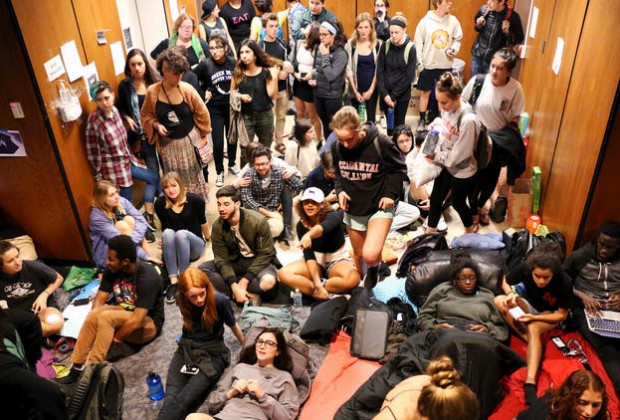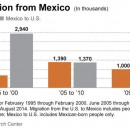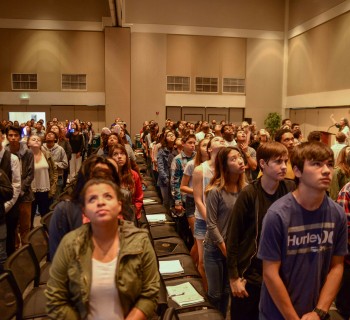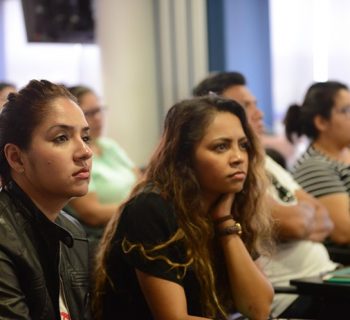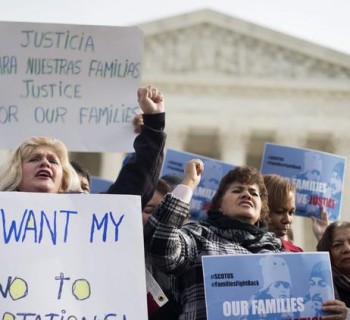By Teresa Watanabe, L.A. Times ~ November 21, 2015
Student protesters at Occidental College announced they will end their weeklong sit-in by Saturday, vowing to continue their fight against racial bias at the liberal arts campus.
"While the occupation is over, the movement is not," said Abhilasha Bhola, a movement leader and senior majoring in diplomacy and world affairs.
Since Monday, students have occupied the Arthur G. Coons Administrative Center, demanding greater funding for minorities, more diverse faculty and the resignation of President Jonathan Veitch, among other things.
The protests had started the previous week, when more than 500 students, faculty and staff held a rally for racial justice at Occidental and in support of other students of color at the University of Missouri, Yale University, Ithaca College and Claremont McKenna College.
Veitch refused to step down. But he announced he agreed with several of the student demands this week, including diversifying the faculty, creating a black studies program, increasing funding for diversity initiatives and training all campus staff on minority student needs.
All 80-plus faculty members who attended a recent meeting on the issues voted to support the student demands for more diversity.

Students at Occidental College in Eagle Rock announced they would end their occupation of the Arthur G. Coons Administrative Center. They were protesting the administration's handling of complaints about lack of diversity and discrimination. (Mark Boster / Los Angeles Times)
Veitch announced Friday that the college would form committees to oversee progress on the diversity initiatives and to review campus safety practices by Dec. 15. Increased funding for the Intercultural Affairs Office, from $13,000 to $26,000, will be delivered by Wednesday, he said.
"We're glad the sit-in ended as it began: peacefully and safely," said Marty Sharkey, the school's associate vice president of marketing and communications. "We look forward to working together with our students in the days and weeks ahead to meet our mutual goals."
Students have invited Veitch to a meeting Monday to discuss how they would hold him accountable to his promises.
Bhola said she viewed the protests as a success despite the failure to force Veitch to resign. She said she was particularly thrilled by the increased funding for the Intercultural Affairs Office and the pledges to start a black studies program after what she said was four decades of requests for one.
"I believe students were able to shift the campus culture by starting conversations about racial justice and sexual assault and forcing people to recognize their privilege," she said.
"I'm exhausted," she added, "but definitely ready to do more."
About 42% of the 2,100 undergraduate students at the Eagle Rock campus are minority or multiracial.
###
Protests over race issues at Occidental are 'just the beginning,' students say
By Jason Song, L.A. Times ~ November 20, 2015
They had occupied the administration building at Occidental College for days, giving it the vibe of a packed airport waiting area, with power cords snaking across the floor, students typing quietly on their laptops and sleeping bags at the ready.
But, on Wednesday night, the protest went mobile. About 300 students angry over what they regard as racial insensitivity on campus marched a quarter of a mile to the alumni center, where they had been told administrators and college President Jonathan Veitch were working.
They left a couple dozen students behind — just in case the administration tried "to 'Mad Max' us," as one student put it, referring to the action movie in which some characters leave one site and return to find it occupied by another group.
Shortly after the protesters arrived at the alumni center, campus security was out in force. The Los Angeles Police Department arrived 20 minutes later. There were a few tense moments before the students decided to return to Arthur G. Coons Hall, claiming victory.

Mariel Guido, 18, left, Melissa Morales, 19, middle, and Nasira Pratt, 18, work on homework in the lobby of Occidental College's administration building. Students are occupying Arthur G. Coons Hall to protest the school's handling of diversity issues. (Francine Orr / Los Angeles Times)
"We needed to let them know there's no place to do work," said Danielle Raskin, a junior. "We needed to show them that we're not going anywhere until our demands are met."
The scene illustrates the tense but also relatively tame protests that have rocked the Eagle Rock liberal arts college over the last week. The students say it's their right to protest problems on campus, and the administration is largely letting them do so with little resistance. Students who sleep overnight inside the hall have plenty of bottled water, snacks, hand sanitizer, phone chargers and laptops that illuminate their protest zone at night. There have been between 70 and 120 campers each night.
"We're not going to shut anything down," Marty Sharkey, the school's associate vice president of marketing and communications, said earlier this week. "They've been conscientious and respectful."
The demonstrators have a list of 14 demands, including increasing student and faculty diversity and removing the LAPD from the campus. Perhaps most important, they are demanding Veitch immediately step down.
Occidental's board of trustees put out a statement this week saying Veitch has its full support. But the college has been moving aggressively to address concerns.
On Thursday, school officials agreed to some of the students' demands, including diversifying the faculty, creating a black studies program and increasing the budget for diversity initiatives. They also proposed hiring a mediator to deal with the aftermath of the unrest and said they would study other demands such as "demilitarizing" security.
But students say they are not entirely satisfied.
"We want to see action, not an email," said junior Cruz Riley. "There's a huge level of mistrust."
Occidental, perhaps best known as President Obama's alma mater, has long been known for its commitment to diversity.
In 1995-96, 44% of non-international Occidental students reported that they were minorities. This year, about 42% of students said they were minority or multiracial, according to school statistics.
Protesters said they started planning to take over Coons Hall after they held a demonstration about diversity and campus issues Nov. 12. Veitch addressed the crowd during the protest but left when students began discussing alleged incidents of sexual assault.
Some students took that as a sign of the president's indifference to their concerns, but Occidental administrators said Veitch left because he felt his presence was "no longer constructive."
Lindsey Ingram, a black first-year student, said she has been sleeping at Coons since Monday because she believes administrators should do more to combat racism on campus. Ingram said her peers have touched her hair and body without permission and called her racial names.
During orientation, one of her peers asked her what sport she plays. "That was the first question I got here," she said.
"So being uncomfortable [in Coons] is nothing compared to how I've been uncomfortable since I've come here."
Coons, which houses Veitch's third-floor office suite, now has signs with the movement's hashtags — #whyobamaleft and #movementnotamoment — and a gender-neutral bathroom on the third floor. School employees have set up a desk outside where students can get flu shots.
"Cough into your elbow if you need to cough," one handwritten sign said inside the building.
Some students have taken on a combative tone with administration, taping up signs featuring a picture of Sharkey throughout the building. "Do Not Engage With This Man," the sign read.
But many also said the experience has been a chance to meet and bond with their peers and even have a little fun at times. After leaving the alumni center Wednesday, students played music at Coons and had a small dance party. Students have also had teach-ins and yoga sessions.
"Looking into the crowd and seeing so many different demographics and seeing the change in their eyes has been great," said Matt Riback, a junior who was still wearing his pajamas at lunchtime on Thursday.
Some students said they believe administrators are hoping that the protests will die down soon, especially because finals and Thanksgiving break are approaching.
"This is just the beginning," Riley said. "There will be [a demonstration] the first day after break."
Sharp divisions emerge on campuses as some criticize activists' tactics as intimidation

Alton Luke II, an African American student at Occidental College, says he has been criticized for not joining the school's diversity movement. “It’s not a healthy environment," he says. (Irfan Khan / Los Angeles Times)
By Teresa Watanabe, L.A. Times ~ November 20, 2015
Alton Luke II is an African American sophomore at Occidental College who backs the broad goal of racial equity for students. But he has chosen not to support the minority student movement aimed at ousting college President Jonathan Veitch and improving campus diversity — and bluntly announced his views on Facebook this week.
For that, he has paid a price.
Luke said some of his friends, both black and white, have started ignoring him. He's been called ignorant. He said the hostility of some protesters toward those with different views is a major reason he is not supporting their current uprising.
"They're doing what they claim white people do to us, which is marginalize us and cast us as the bad guy," said Luke, a graduate of Long Beach Polytechnic High and kinesiology major who aims to become an orthopedic surgeon. "You can't have a different opinion here or you're persecuted. But I'm standing against their tyrannical and unjustified actions."
Protests at Occidental, Claremont McKenna, Yale, Ithaca, Brown and other campuses throughout the nation appear to have wide support as they demand action to address the bias some minority students say they face.
But sharp dissent over the movement's tactics is also emerging, as critics have begun to step forward.
At Claremont McKenna College, where protests have led to the resignation of a top administrator, more than 300 students sent a letter to the campus community expressing support for the fight against racial discrimination. But they called the use of hunger strikes to force Dean of Students Mary Spellman to step down "extremely inappropriate" and also castigated the cursing at administrators at a recent student protest, the "cyberbullying" of students over an offensive Halloween costume and the filing of a federal civil rights complaint against Claremont.
"Never have we been more divided as community. Never did we think the day would come where we were scared to speak our minds, where fear of our fellow students' rage silenced us," said the letter, signed on behalf of the students by Nathaniel Tsai, a junior majoring in government. "It is time for the demonstrations and the hostile rhetoric to stop."
At Yale University, nearly 800 students, faculty, staff and others sent a letter this week to campus President Peter Salovey expressing concerns about several student demands — among them mandatory diversity sensitivity training, an ethnic studies requirement and the firing of a faculty member who questioned staff warnings about culturally offensive Halloween costumes.
Zach Young, a junior majoring in ethics, politics and economics, had joined the Yale student "march of resilience" against discrimination this month. But he helped spearhead the letter after he saw the subsequent student demands — especially the call to fire Erika Christakis, a faculty member who had challenged the costume warning from the Yale Intercultural Affairs Council, asking whether there was no longer room for students to be "a little bit obnoxious … a little bit inappropriate or provocative or, yes, offensive."
The letter defended Christakis' free speech rights and called the training and curriculum demands "a menace to the cause of liberal education because they are clearly driven by a particular political agenda devoted to conversion instead of intellectual exploration."
"I thought there needed to be an organized, vocal opposition to give [Salovey] an instrument to oppose the demands," Young said. Salovey announced Tuesday that he supported Christakis.
Young and Luke said they have never been threatened with physical violence for their views — unlike some protesters, who have reported receiving anonymous threats on the Yik Yak social media site.
Greg Lukianoff, president of the Foundation for Individual Rights in Education in Philadelphia, said students had always been the most reliable allies in his 14 years of defending free speech rights in higher education. But no longer, he said.
"It's disheartening to see how they are now using freedom of speech to demand there be less freedom of speech," said Lukianoff, whose foundation supported Christakis.
Some faculty members have also spoken out against the protests, including Glenn Loury, a Brown University professor who has long researched racial inequality and wrote that he was "appalled" by student allegations of endemic campus racism. Loury, who is African American, said he had been lavished with university resources for his work and well treated by open-minded colleagues.
In a Facebook post, he rejected student calls for a "revolutionary reshaping" to fight campus bias through diversity training, special staff to recruit more minority faculty and other steps, saying they could lead to "intellectual mediocrity."
At Claremont, a second critique was launched this week by two students who called for letters of support for Spellman, saying she had been unfairly targeted. The former dean became the lightning rod for long-standing complaints by minority students alleging university inaction in addressing racial bias and providing resources, such as funding and a dedicated space, to aid them.
In hundreds of fliers posted throughout the campus, students described broad experiences with discrimination, including vandalism at the Queer Resource Center, defacement of Black Lives Matter posters, racial slurs and perceived mockery of their cultures.
Spellman was particularly criticized for telling a Latina student she would work hard to support students who "don't fit our CMC mold." The former dean could not be reached for comment.
In marshaling support for Spellman, seniors Rachel Doehr and Katharine Eger said they supported the broader effort to give voice to marginalized students but expressed concern that the effort "quickly morphed into a torrent of seemingly uncontrollable anger that left casualties in its wake."
The students said Spellman had counseled hundreds of students at Claremont and led efforts to establish a new campus center for sexual assault prevention and support, among other things.
One student who submitted a letter of support but asked for anonymity to protect her privacy said Spellman had counseled her through months of depression.
"She always did her job with a huge amount of heart and love," the student said.
Taylor Lemmons, one of two students who launched a hunger strike in support of calls for Spellman's resignation, said she felt "deepest empathies" toward such students. But she said Spellman had ignored marginalized students and that her resignation — which, she noted, officials chose to accept — would help the campus move forward.
"It is not enough to help just some students," Lemmons said, adding that she did not regret her hunger strike. "She was legally responsible for ALL students, and students were blatantly ignored."
Campus President Hiram Chodosh has announced that steps would be taken to better address diversity on campus, including new administrative leadership positions.
The letter of dissent from Tsai and others asked the Latina student who filed a federal civil rights complaint against Claremont to rethink her action and allow the campus to find other ways to resolve the issues.
It also criticized what it called the cyberbullying of a Claremont student and her friend who were posted on social media wearing Mexican sombreros and mustaches for Halloween. The students have repeatedly apologized, but requests to remove the photo have been rejected.
At Occidental, Luke's Facebook post drew 167 likes and overtures from some movement supporters who affirmed his right to disagree and their willingness to listen.
Danielle Raskin, a junior in urban and environmental policy and a movement leader, said those with questions or doubts were encouraged to come by the protest site to discuss and learn more.
"As a community and movement, we've been welcoming and inclusive to those with different views," she said.
But Luke is wary, saying the campus' political climate is stifling. Earlier this week, he said he was attacked on social media as "trash" who was endangering women by throwing a party and offering them free admission.
"Either you're liberal or you're wrong," he said. "It's not a healthy environment."

